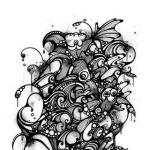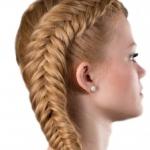After eating I immediately want to go to the toilet in a big way. A newborn baby is pushing. The child immediately goes to the toilet after eating.
Functional diarrhea, that is, diarrhea after each meal, is a common phenomenon and causes many serious inconveniences for patients. However, people often refuse to go to the doctor with such an unpleasant problem, hoping that it will disappear on its own, or trying to alleviate their condition by taking medications.
There can be many reasons for this condition, and only a doctor can accurately determine the cause of the disease and prescribe appropriate treatment. Diarrhea is far from a harmless phenomenon, so you should not refuse professional treatment.
The main causes of diarrhea after eating
If immediately after eating there is frequent loose stool, this indicates functional disorders in the intestines: the food bolus quickly moves through the gastrointestinal tract, while the food is not properly digested and absorbed.
There may be several reasons for this condition:
- Operational disruptions nervous system. This condition is known as “bear sickness” or irritable bowel syndrome. The patient may encounter it during a period of prolonged stress; for example, the syndrome may occur in students during a session. Neurogenic diarrhea is usually only part of a complex of symptoms; prolonged stress can lead to vegetative-vascular dystonia and various neuroses.
- Infectious intestinal lesions. It's sharper, but possible reason: The body seeks to empty the intestines of foods it considers dangerous. To eliminate a painful condition, it is necessary to cope with its cause using medicinal methods.
- Dysbacteriosis. This is a disorder of the intestinal microflora that can develop after long-term use antibiotics or poor diet. If the body is unable to digest food, it tends to get rid of it, which can lead to diarrhea.
Intestinal upset can also result from eating unusual or spoiled food. In this case, it lasts no more than 1-2 days, and if the process does not stop, you should consult a doctor.
Diarrhea not only brings discomfort and interferes Everyday life: Frequent loose stools lead to dehydration and leaching of essential microelements such as magnesium and potassium. It is especially dangerous for children, so young patients need to be taken to a doctor as quickly as possible.
Diagnostic methods
How to determine when it's time to see a specialist? First of all, you need to pay attention to the nature of the disease. If there is no pus or blood in the stool, this indicates the absence of serious intestinal damage.
If it looks greasy and harsh bad smell, this is a sign of the presence of fat in the stool, that is, the digestion of food is not completed. The doctor will ask the patient in detail about the frequency of bowel movements, the appearance of urges at night, and the diet.
Signs of infection will include fever, bloating, nausea, and deterioration in general health. If an intestinal infection is suspected, the doctor may suggest hospital treatment to prevent infection of others.
A series of tests will be prescribed to confirm or deny the presence of infection. Much more often, the cause of constant diarrhea is a nervous disorder, thus the body reacts to prolonged overexertion.
In this case, the urge is observed in the morning immediately after breakfast and in the afternoon after meals, and at night the patient sleeps peacefully, without feeling any discomfort. Blood and stool tests do not reveal any signs of infection or other bowel problems.
The most effective method Treatment in this case will be to eliminate the cause of stress: as soon as the state of the nervous system normalizes, all somatic manifestations of nervous disorders will go away by themselves.
However, the diagnosis of “neurogenic diarrhea” can be made only after all studies confirming the absence of dysbacteriosis and infectious diseases. It is quite difficult to diagnose this condition in children: they are often embarrassed to talk about the problem, and problems with studying or communicating with peers can lead to severe manifestations of a nervous disorder.
Traditional and medicinal methods of treating functional diarrhea
What to do if an unpleasant condition takes you by surprise, and the problem has to be solved immediately? There are a number of folk remedies that will help eliminate symptoms of diarrhea and have a beneficial effect on intestinal health:
- A decoction of oak bark can be used for treatment. It is brewed with boiling water; you can take a glass of the decoction immediately after eating. You can use it twice a day, for example, morning and evening. Usually, a few doses are enough to cope with intestinal dysfunction.
- A simple recipe against diarrhea: regular buckwheat porridge without salt. You need to eat a few spoons of porridge on an empty stomach, and there will be no further problems with diarrhea.
- The following remedy can be used against diarrhea in children: you need to grind one nutmeg, then the resulting powder is dissolved in a glass of milk. The mixture should be given one teaspoon at a time and should be taken every 4 hours.
- Strong tea, decoction of acorns and some others also have fixing properties. folk remedies. Among them is an extreme recipe: a teaspoon of salt is dissolved in 100 g of vodka. The product should be taken immediately after meals.
If possible, you should first consult a doctor: diarrhea is one of the body’s defense reactions, and with its help the intestines are cleansed of toxic substances. If this process is interfered with, serious intoxication is possible: diarrhea may be caused by infection or poisoning.
If an intestinal disorder occurs for the first time, it is recommended not to interfere with the cleansing process by providing the patient with warm, generous fluids to prevent dehydration. Reception will help activated carbon In addition, therapeutic fasting is necessary.
Since the food is not properly digested anyway, eating it repeatedly is like throwing coal into a firebox. Fasting with plenty of fluids is recommended for about 24 hours. If diarrhea is constantly observed at approximately the same time, the patient is not bothered by night urges, but they occur immediately after meals, most likely we are talking about a neurological disorder, and it is advisable to eliminate its cause as quickly as possible.
During periods of stress, the doctor may prescribe sedatives, and in case of prolonged neuroses and severe stress, antidepressants. Diarrhea in this case is only one of the manifestations of the disease, and complex treatment of the nervous system will be required.
You will learn how to treat diarrhea from the video:
Tell your friends! Tell your friends about this article in your favorite social network using social buttons. Thank you!
Most people have bowel movements digestive tract occurs once or twice a day. The frequency of once every couple of days is also not considered a deviation.
Few people manage to avoid disruptions in the gastrointestinal tract - constipation or diarrhea. The cause is isolated pathologies or serious diseases.
What if immediately after eating you need to run to the toilet in a big way?
Of course, this introduces certain complications into life, but is it a worrying sign? Only a doctor can answer.
Reasons for visiting the toilet after eating
A person who knows that after lunch or dinner he will need to look for a toilet does not feel free. He can’t stay at home all the time, where the bathroom is located a few steps away?
The reasons for this condition are varied. First of all, frequent urge to go to the toilet after eating can be explained by irritable bowel syndrome (IBS). It is characterized by a complex of functional disorders of food digestion in the gastrointestinal tract. In this case, there is no organic damage to the intestine itself.
IBS occurs in people between 25 and 45 years old, and is more common in women. In addition to constant trips to the toilet after eating, you also have to endure the following symptoms:
- discomfort and pain are felt in the lower abdomen;
- the stool becomes foul-smelling and liquid. It contains a lot of mucus;
- increased gas formation and flatulence.
New Year's video recipe:
In addition to IBS, the cause of the urge to defecate after eating can be:
- Thyrotoxicosis(hyperthyroidism) – increased hormonal activity of the thyroid gland.
- Acute and chronic colitis, occurring in the area of the large intestinal mucosa.
- Crohn's disease– gastrointestinal pathology with unclear etiology. It occurs in a chronic form and can affect all departments digestive system. The disease is a type of inflammatory disease of the gastrointestinal tract.
- Polyposis– single or multiple polyps appear on the mucous membranes of the stomach and intestines – benign formations. The disease is more common in men. Polyps must be promptly removed so that they do not become malignant.
- Colorectal cancer. This disease refers to a malignant tumor of the rectum (rectum) or large intestine (colon).
- Intestinal dysbiosis– clinical and laboratory syndrome, the appearance of which is caused by pathological changes in the structure of the intestinal microflora. This applies to both its qualitative and quantitative composition.
- Intestinal tuberculosis– a chronic infectious disease that occurs under the influence of mycobacteria. They affect the intestinal wall and contribute to the formation of specific granulomas that destroy the digestive organs.
- Worm infestation– entry into the body of worms various types. Products and the results of their vital activity have a destructive effect on internal organs and impair the functioning of the digestive system.
The reason for visiting the toilet after eating may be insufficient production of bile in the body. In this case, the feces become greasy and shiny, lose color and become almost colorless. Frequent bowel movements lead to bleeding of the anus. Behind a short time a person’s quality of vision noticeably decreases, and bone turns into brittle and brittle. A set of such symptoms signals possible pathologies of the biliary tract, liver or duodenum.
It is possible that the reason for the urge to go to the toilet is not physiological reasons. They should be looked for in changes in psychological state. Neuroses and increased stress can upset the usual functioning of the gastrointestinal tract.
How to get rid of the problem?
Illnesses force me to visit the toilet several times a day. Most often, a person's stool is sparse. Change it external signs. This refers to the color, smell and consistency of stool. It’s really bad when clots or specks of blood appear in them.
You need to respond to obvious signs of the disease immediately. A visit to a gastroenterologist becomes urgent. To make a correct diagnosis, the doctor will prescribe tests and studies:
- blood, urine and stool tests;
- Ultrasound of the abdominal cavity;
- colonoscopy - examination of the intestines;
- fibrogastroscopy – study of the condition of the stomach, esophagus and duodenum;
- rectoscopy - examination of the rectum.
If you suspect an intestinal infection, it is possible that you will need to undergo hospital treatment.
If blood, stool and urine tests are normal, and ultrasound results do not indicate the presence of serious problems, you can do without a more detailed examination. Minor drug therapy will bring the condition back to normal. Of course, the doctor will definitely introduce you to the basic recommendations regarding the daily menu.
Traditional medicine as a help
When visits to the toilet after eating do not stop, diarrhea continues for a long time - dehydration of the body occurs and the removal of useful substances, without which normal activity is impossible.
In addition to drug treatment you can use the following methods:
- Prepare a strong infusion of oak bark. You should pour a glass of boiling water over a tablespoon of dry raw materials. The bark is infused for about an hour. Then you need to strain the drink and take one (two) teaspoons throughout the day. This amount of infusion is enough for one day. The next day you need to prepare fresh.
- Make a tincture with alcohol. Grind a teaspoon of oak bark thoroughly and pour in 0.4 vodka. You need to prepare the tincture in advance, since it will take a week for the bark to be properly saturated with alcohol. In the morning and evening you should take 20 drops of the finished product. Oak bark is an excellent astringent, so it effectively helps with gastrointestinal problems and hemorrhoidal bleeding. The infusion can stop the constant urge to visit the toilet after eating.
- Infusion of Canadian small petal. It is necessary to pour a teaspoon of this dried and crushed herb into a saucepan. Pour in 0.25 liters of boiling water, cover and let sit for 20 minutes. Then strain the product. Drink one cup of infusion after each meal.
- Extreme recipe: dissolve a teaspoon of salt in 100 grams of vodka. The product should be taken immediately after meals.
Strong black tea, a decoction of acorns and an alcoholic tincture of green nuts have strengthening properties.
A young new mother treats her baby with special trepidation and even some fear. After all, she knows and can’t do almost anything, and caring for a newborn raises a lot of questions and worries in her. Many mothers are faced with a problem when their baby strains and turns red, and may also grunt or growl. As a rule, such a sight does not inspire optimism in them.
It is very good and correct that you pay attention to such manifestations. But just don’t rush to do anything: it is likely that everything is fine with the baby, and your actions can only harm him. Why does a newborn strain, and what to do in this case? Let's try to figure it out.
Don't rush to treat
The fact that a newborn baby is pushing does not mean anything bad. Almost all (or very many) babies do this up to 3-4 months and even longer, and doctors explain this behavior in different ways.
The most common version: the baby cannot go to the toilet any other way, because his abdominal muscles have not yet developed, as well as the anal muscle. Despite the fact that the baby blushes and makes sounds that frighten you, he may feel quite comfortable. Just to poop or even pee, he has to strain a little. In addition, the newborn is always in a horizontal position, and even gravity cannot help him in this matter. And on top of that, soft, pasty stools do not put enough pressure on the anus for bowel movements to occur easily and naturally.
Some experts believe that straining and grunting are associated with imperfect work gastrointestinal tract. While the intestines are populated by bacteria, forming their own microflora, and while they are learning to digest food, the baby experiences new, incomprehensible feelings, as if getting used to the natural processes taking place.
It’s not surprising that the child blushes – don’t worry. If you want to help your baby in some way, then press his legs to his tummy or make him a bicycle to activate the intestines and facilitate the passage of feces.
Pediatricians also advise putting the baby to the breast: perhaps he is worried about something or experiencing some kind of discomfort. The fetal position will help calm your baby: curl him up and hold him close to you. Doctors suggest that by pushing, the baby expresses his dissatisfaction. Perhaps he doesn't like something or something is bothering him. Just try to find out the cause of the disturbance and eliminate it (feed, change clothes, go for a walk). By the way, there is also an opinion that newborns express any emotions in this way, since they still don’t know how to do it any other way. This is a kind of baby’s first language: he is trying to convey something to you - and he strains, and maybe even grunts.
If nothing else bothers you other than straining, then most likely there is no reason to worry. The main thing is that the baby feels good: sleeps peacefully, eats enough, and has bowel movements regularly. However, it is likely that the newborn is straining due to problems with the digestive system. In this case, the child behaves quite restlessly: he cries, rushes about, presses his knees to his tummy, kicks his legs.
When should a child be helped?
Intestinal colic forces a newborn to push and at the same time freak out and cry. Almost all new parents face this problem. Do not rush to treat your baby even with such harmless means as you think, like dill water. First, adjust your diet. Eliminate salt, sugar, flour, legumes, cabbage, cucumbers, sweet peppers, radishes, grapes and other foods that cause gas from your diet.
If the baby is artificial, then it is extremely important to choose the right milk formula (perhaps it is because of it that the baby is swelling). Children on artificial feeding, you need to add some water.
Make sure that your baby does not swallow air during feeding by positioning him correctly at the breast and holding the formula bottle correctly.
Analyze everything last changes and appointments – yours and your children’s – and try to find the reason for the formation of gases in the child. For example, mothers of some children note that colic and straining appeared in their children after the administration of vitamin D3.
To stimulate the functioning of the gastrointestinal tract and in order to release swallowed air, place the baby on his tummy as often as possible between or before feedings, and then lift and carry him in a “column”, in an upright position. Massage the abdomen, stroking it clockwise with your palm, tuck your legs, lightly pressing them on the stomach.
Local heat will help relieve spasms: press your baby close to your stomach or place a heated diaper on his tummy.
And only if all these methods have been tried, but have not yielded results, seek help medicines and remedies, after consulting with a doctor (most often in such cases, children are prescribed Espumisan).
Constipation or malnutrition?
It's a little worse if the baby develops constipation. Naturally, the baby will push, making considerable efforts to poop. Do not allow this to happen, but if constipation cannot be avoided, then immediately adjust the feeding and principles of caring for the newborn.
If the child is on breastfeeding, then the regularity and consistency of stool will largely depend on the mother’s diet. Therefore, often it is enough just to change your menu - and the child will stop pushing to poop. Be sure to drink plenty of fluids and introduce fresh kefir into your diet.
The situation is different with artificial ones. It is not uncommon for children to have bowel movements in response to formula milk. Finding the right mixture can be very difficult, and it may be impossible to do without the help of specialists.
In addition, unfortunately, our care and guardianship can result in a number of problems for the baby. If you panic several times ahead of time and give a gas tube or a cleansing enema to the child unnecessarily, soon the baby simply will not be able to fart and poop on his own. You should be extremely careful with this and think three times before resorting to such methods.
In fact, babies very rarely experience constipation. Mother's milk is the most in the best possible way corresponds to the abilities of the digestive system of a newborn, therefore, as a rule, “milk” babies do not have difficulties with bowel movements - they walk “largely” much more often than artificial babies. Infants who are bottle-fed are more susceptible to constipation.
If a newborn suffers from constipation, then during bowel movements he strains a lot, blushes and growls, and may even cry or be capricious - trying to poop brings some discomfort and even pain to the baby.
But keep in mind that we are talking about constipation only in the case when the baby does not walk “at large” for more than 2 days and he certainly has hard stool(like pebbles). If the baby poops infrequently, but the stool has the usual consistency - soft, mushy, and at the same time the baby is underweight, then most likely we are talking about the so-called “hunger constipation”. This occurs when a newborn does not receive enough milk. A situation arises when he simply has nothing to defecate due to constant malnutrition. In this case, it is necessary to supplement the baby’s feeding, pediatricians assure.
Summing up, I would like to once again appeal to young mothers: do not rush to treat your children. Sometimes medications do more harm than good. And tummy problems that cause the baby to strain and blush can almost always be solved without medications. Moreover, many pediatricians consider this phenomenon to be normal in newborns. The baby may push until he begins to receive solid food(by the way, from now on it is important that children's menu there was enough dietary fiber). The main thing is that nothing bothers him.






